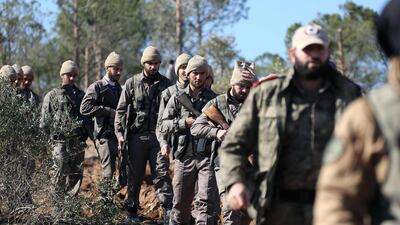Kurdish forces trying to fend off a Turkish military offensive in northern Syria are in the awkward position of demanding help from the government they want greater autonomy from.
The self-proclaimed Kurdish administration has urged the forces of president Bashar Al Assad to protect their enclave of Afrin, which Turkish forces, assisted by Syrian rebels, attacked on January 20.
The minority, which achieved increased autonomy on the back of Syria's seven-year-old conflict, rejected Damascus's condition of a return of federal security forces and institutions in their region.
Such moves would bring an end to Kurdish control over Afrin, one of the three regions in Rojava, the administration unilaterally proclaimed over the Kurds' Syrian heartland which runs along the Turkish border.
"The Kurds always wanted good relations" with the government, said Kurdish affairs specialist Mutlu Civiroglu, stressing that the minority never pursued fully-fledged independence.
"But they don't want to go back to the situation before the war, when they didn't really exist, they didn't have any rights," the analyst said of the Kurds, who account for about 15 per cent of Syria's population.
Long oppressed by Damascus, the Kurds took advantage of the escalation of a conflict that began in 2011 with nationwide opposition protests to secure de facto autonomy over Syria's northern regions.
They brought the long-banned Kurdish language back to schools, set up their own security apparatus, which includes a militia called the People's Protection Units (YPG) that acts as an army.
The force, which has close ties to Turkey's own Kurdish rebellion, emerged as a major player in the war against ISIL and a partner of choice for the US-led coalition.
The Turkish assault on Afrin has exposed the ambivalence of the relationship between the Kurds and Mr Al Assad, who does not regard the minority as a direct threat but resents their emancipation.
Turkey considers the YPG to be a terrorist group and fears the empowerment of Syria's Kurds could be contagious.
At least 67 civilians and 85 YPG fighters have been killed in 10 days of Turkish strikes and shelling on Afrin, according to the Syrian Observatory for Human Rights. The Britain-based monitoring group and Kurdish sources said on Tuesday that Ankara had stepped up its air strikes. But despite this, the Kurds still reject the idea of handing the region back.
Instead, they have asked for the deployment of federal Syrian forces along the border with Turkey.
The Kurdish proposal provides for "the return of Syrian border guards and the raising of the Syrian flag at the border to reassure the Turks", said Ahed Al Hendi, a senior adviser to the Kurdish administration.
"The Kurdish defence, police and security forces would be maintained," said Mr Hendi, a member of the Syrian Democratic Forces, of which the YPG is the backbone.
"Surrendering Afrin to the Syrian regime, that's impossible," he said, adding however that the government has yet to give a formal reply.
________________
Read more
As Turkey fights in Afrin a different battle is unfolding at home
Syria's Kurds will not participate in Sochi talks
________________
On Thursday, the self-governed region of Afrin had urged Damascus to enforce sovereignty over its borders and prevent Turkish jets from violating Syrian airspace.
So far, Damascus has only condemned the Afrin assault as a "brutal Turkish aggression".
Bassam Abou Abdallah, who heads the Damascus Centre for Strategic Studies, argued the Kurds could not have their cake and eat it.
"The Kurds should take responsibility for what they have done … the Syrian state is not at their service and can't just be called when you need it," he said.
Before the offensive on Afrin, Russian forces that had been stationed in the area and trained YPG units withdrew, sparking accusations that Moscow had sanctioned Ankara's operation.
Kurdish officials have said that Moscow had offered them protection against Turkey if they relinquished their territory to the Syrian government and that Russia pulled its air support when they refused.
Some analysts argued that Damascus was allowing Turkey to conduct military operations on its soil because a few more days of Kurdish losses would serve its interests.
"Maybe they want Kurdish forces further weakened," Mr Civiroglu said.
"This might force them to agree to their demands."

